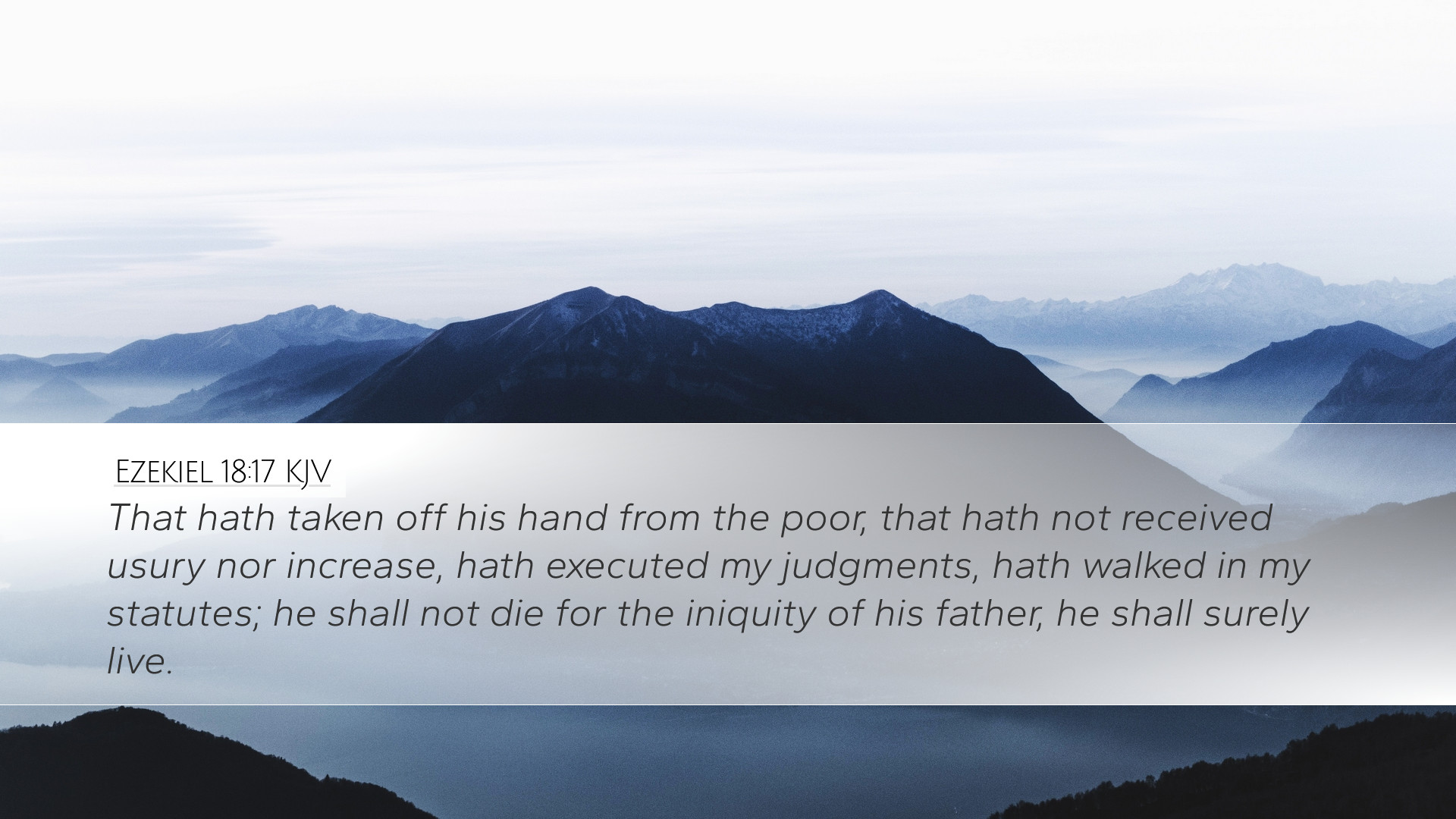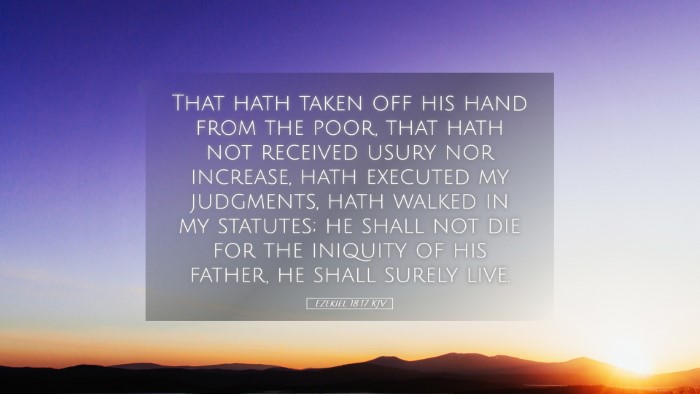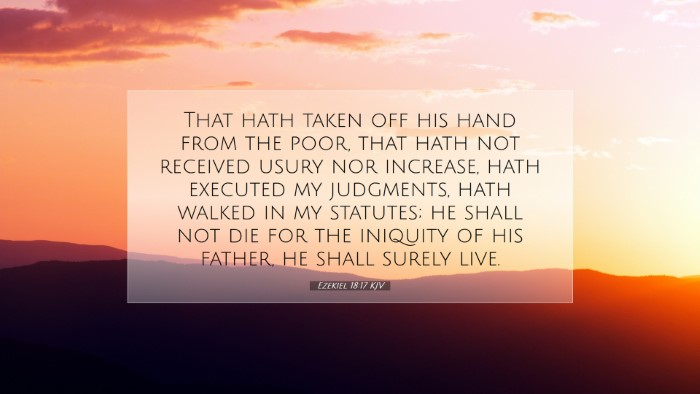Ezekiel 18:17 - Commentary Summary
Ezekiel 18:17 (NIV): "He keeps his hand from sin and takes no usury or excessive interest; he keeps my laws and follows my decrees. He is righteous; he will surely live, declares the Sovereign Lord."
This verse encapsulates a profound principle in the biblical narrative regarding righteousness and ethical living. Ezekiel’s ministry emphasizes personal responsibility and individual accountability, particularly in a context where Israel had experienced significant moral decline.
Contextual Overview
The Book of Ezekiel, a prophetic text, is characterized by its focus on the spiritual condition of Israel and the necessity for repentance and restoration. In chapter 18, Ezekiel addresses the misconceptions surrounding generational sin and individual judgment. He declares the righteousness of the individual who turns from sin, thus countering the prevailing belief that children suffer for the sins of their parents.
Insights from Public Domain Commentaries
Matthew Henry's Commentary
Matthew Henry interprets Ezekiel 18:17 within the broader context of justice and personal righteousness. He highlights the ethical dimensions of the verse, emphasizing that true righteousness involves both a negative and positive response to God's law:
- Abstaining from Sin: The individual is marked by a conscious effort to avoid sin, which is evidenced by keeping their hand from wicked actions.
- Social Responsibility: Henry emphasizes the moral imperative against usury, indicating that exploiting the poor or charging excessive interest is against God’s principles of justice.
- Obedience to Divine Laws: The essence of righteousness is found in adherence to God’s statutes and decrees, reinforcing the importance of a life lived in fidelity to God’s commands.
Albert Barnes' Notes on the Bible
Albert Barnes further elaborates on the attributes of the righteous man described in this verse. He notes:
- Personal Integrity: Barnes underscores that righteousness in the eyes of God is tied to one’s character and choices, not merely familial association. Each person is judged on their own merits.
- The Consequence of Righteousness: The declaration that “he will surely live” reflects God’s promise of life and blessing to those who align their lives according to His will, a reaffirmation of the covenant relationship.
- Repentance as a Theme: This verse serves to encourage the hearers of Ezekiel's message that repentance and reform are possible, and that personal transformation is aligned with God’s mercy.
Adam Clarke's Commentary
Adam Clarke provides a detailed analysis of the socio-economic implications of this verse, particularly regarding usury:
- Ethical Economics: Clarke points out that charging interest, especially on loans to the poor, contradicts biblical principles of compassion and justice. A righteous person embodies these qualities by aiding the vulnerable.
- God’s Justice: He reflects on the nature of divine justice, suggesting that God evaluates not only acts of sin but also the intentions behind actions. True righteousness must stem from a heart transformed by God.
- Covenantal Faithfulness: For Clarke, the righteous individual's observance of God's laws signifies a deep commitment to the covenant, marking them as people of integrity amid a corrupt society.
Theological Implications
The implications of Ezekiel 18:17 extend into various theological discussions and applications:
- Individual Accountability: The principle of individual accountability is foundational to Christian theology—a reminder that each person bears the responsibility for their own choices and actions.
- God’s Mercy and Justice: The balance between God’s justice in punishing sin and His mercy in allowing for repentance is a central theme, encouraging believers that they can always return to Him.
- Social Justice: The text brings to the forefront issues of social justice, encouraging believers to advocate for ethical treatment within economic systems, reflecting God’s heart for the marginalized.
Application for Modern Believers
For pastors, theologians, and students, Ezekiel 18:17 serves as a call for introspection and action:
- Personal Reflection: Believers are encouraged to examine their lives for areas where they may harbor sin or engage in unethical practices, seeking God’s grace for transformation.
- Advocacy for Justice: Pastoral leadership should emphasize the ethical implications of financial dealings, advocating for transparency and compassion in all interactions.
- Teaching as a Responsibility: Educators in the faith community bear a responsibility to teach the importance of obedience to God's laws as a foundation for genuine spiritual life and testimony.
Conclusion
Ezekiel 18:17 is not merely a verse about personal righteousness; it encapsulates a holistic approach to life as ordained by God. Insights from the commentaries of Matthew Henry, Albert Barnes, and Adam Clarke collectively highlight the need for ethical living, individual accountability, and a heart aligned with God’s standards. For today’s believers, this passage invites a profound engagement with scripture that transforms character and community.


